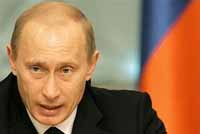Putin holds annual Kremlin press conference
President Vladimir Putin holds his annual news conference on Thursday, expected to hold forth for hours on questions from a Kremlin auditorium packed with more than 1,000 foreign and Russian journalists.

The news conference, televised live on two nationwide state-run channels, is one of a troika of events Putin uses each year to burnish his image as a competent, caring president in control of a resurgent country with a growing economy and global clout.
With the end of Putin's second term approaching as the March 2008 election draws closer, one issue sure to be addressed was succession. The Constitution limits Russian presidents to two straight terms, and the nation has not had a normal transfer of power by popular vote in its post-Soviet history.
Putin was likely to be asked whether he will clearly support a particular protege as his chosen successor, and if so, who will it be. First Deputy Prime Minster Dmitry Medvedev and Defense Minister Sergei Ivanov appear to be the front-runners for the Kremlin nod, but there are plenty of alternate theories about how Putin will end his time in office, including one under which he would not end it at all but stay in power, despite his repeated statements to the contrary.
Putin also is expected to emphasize the economic growth Russia has enjoyed under his watch, which has coincided with high world energy prices that have helped his resource-rich nation, and to stress that the country's leadership must work harder to improve living standards.
In foreign affairs, Putin is likely to speak about Kosovo; he has said a decision on the status of the breakaway Serbian province could send a signal to separatist regions in the former Soviet Union.
Questions about Iraq and Russia's cooperation with Iran also appeared sure to arise. Russia's relations with the West are a perennial topic at the press conference, which gives foreign journalists a rare chance to directly ask a question of Putin and gives Putin a chance to portray Russia, as he often does, as a country under attack from ill-wishers abroad, reports AP.
This year's event comes with Russia's reputation reeling following the killings last fall of two critics, investigative journalist Anna Politkovskaya and former security agent Alexander Litvinenko, who blamed Putin for his radiation poisoning in a deathbed statement. Add to that the continuing Kremlin campaign to limit foreign involvement in key economic sectors and deepened Western concerns about Russia's reliability as an energy supplier after a dispute with Belarus shut down a pipeline to Europe.
Subscribe to Pravda.Ru Telegram channel, Facebook, RSS!


